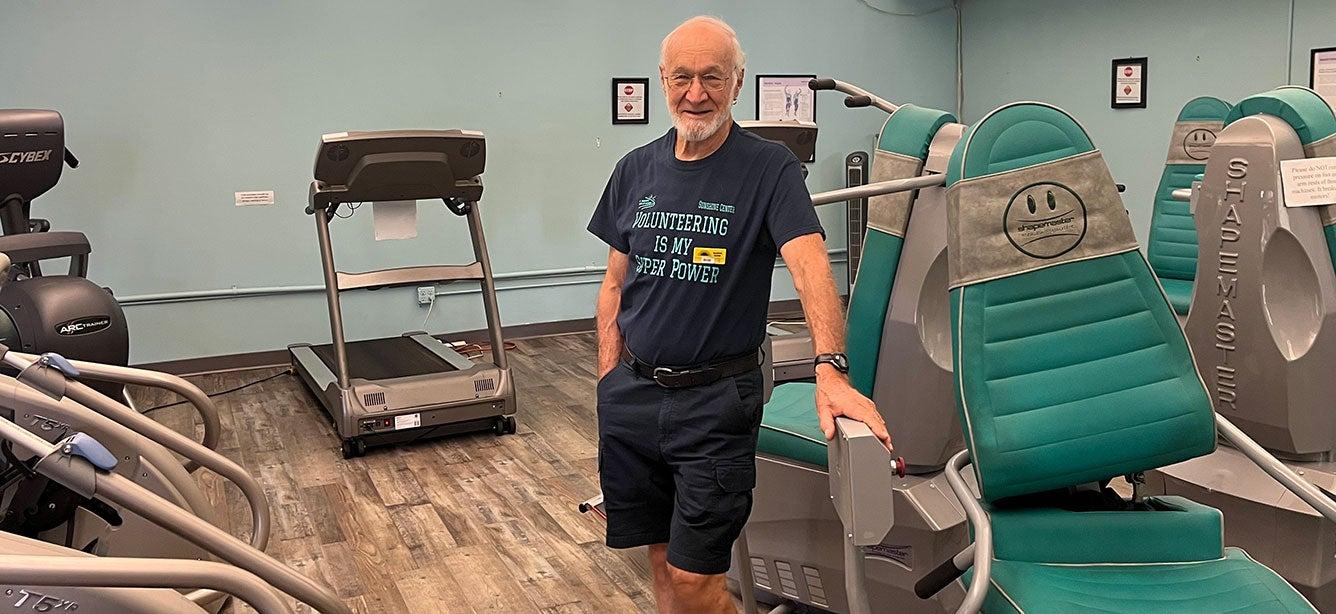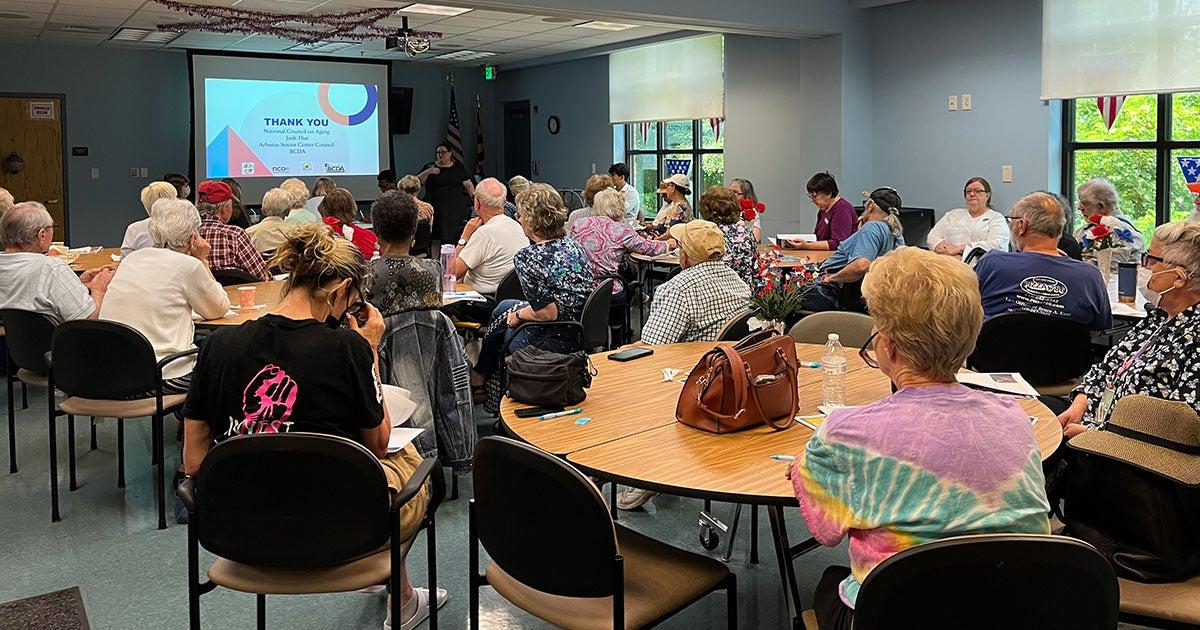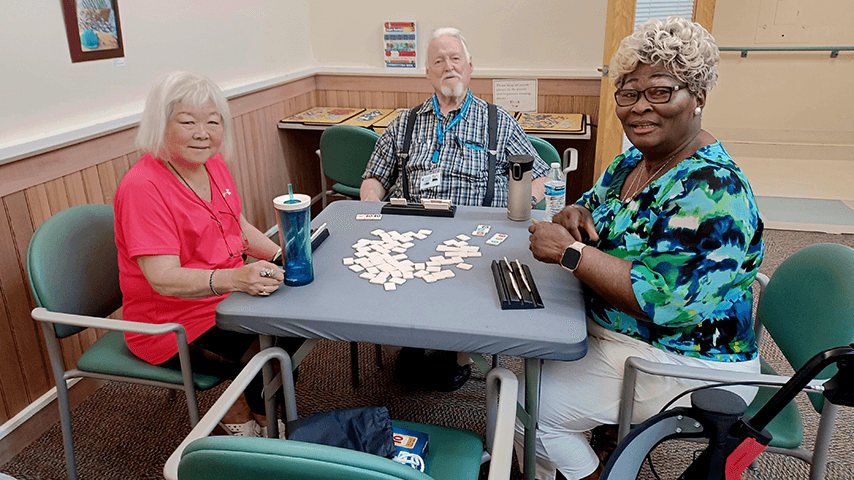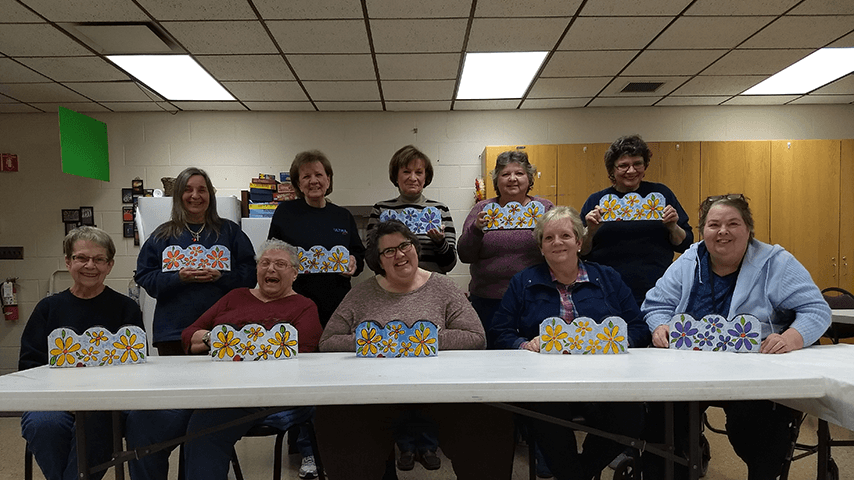
Celebrating 35 years of community service, the Sunshine Center is an urban, multi-service senior center in the downtown area of St. Petersburg, Florida. Run under the auspices of the City of St. Petersburg Leisure and Community Services Department, the center has seen many changes while at the same time remaining true to its origins.
What happens at the Sunshine Center?
The center is dedicated to enriching the lives of older adults, providing:
- Health, fitness, and wellness programs
- Educational and enrichment classes
- Social and recreational activities
- Volunteer and civic engagement opportunities
- Information and assistance to help navigate the maze of services
- Access to social services and support
- Benefits counseling, including help with Medicare
- Support groups
- Financial assistance
- Meals and nutrition programs
- Transportation services
Funded almost exclusively by the city, Sunshine Center is one of 18 community centers but the only one dedicated to serving older adults. In addition to its seven staff, the center thrives with 80 volunteers and robust community partners. The Area Agency on Aging of Pasco-Pinellas, Inc., has continually designated the Sunshine Center as a Community Focal Point.
A true community hub, the Sunshine Center contracts with many agencies, providing office space to organizations at the center including Neighborly Care Network (congregate dining and Meals on Wheels), Pinellas Opportunity Council (Senior Employment), Lions Club Eye Clinic Referral Program, Community Law Program, Gulfcoast Jewish Family & Community Services (counseling), Guardian Group, Moore Medicare Options, and others.
What is the history of the Sunshine Center?
The center was established in 1988 when the downtown housed over 10,000 older adults within walking distance of their property. They started with one state-of-the-art, two-story building and soon had to build an extension, in 1992, to accommodate the number of programs and activities offered to the community. In 1999, the center acquired several other older buildings adjacent to their property, which are designated historical sites. These once housed private clubs that primarily served winter residents. The clubs continue to operate, but the city has assumed control and maintenance of the buildings, and the programming has expanded to include more local residents.
In the last several years, the central core of the city has undergone a dramatic rejuvenation, with several high-end condos being built and a subsequent revitalization of businesses (retail stores, banks, restaurants, museums, etc.) to support the residential growth. Though there are still several subsidized senior residences in the area, the number of older adults living in their own homes has declined. Today, an estimated 75% of their participants have low incomes, the other 15% are average income and about 10% upper income.
The Sunshine Center has been a long-time member of the National Institute of Senior Centers. It was the first center in the state of Florida to achieve accreditation, and former Director Jay Morgan was recognized with NISC’s Founders Award for his leadership.
What’s new at Sunshine Center?
A recent program brought incredible buzz into the center. As part of a partnership in an initiative with NCOA’s Center for Healthy Aging and the biotechnology company Amgen, Sunshine Center tested an innovative, two-part bone health program.
The program included a one-time lecture on a health topic (osteoporosis) followed by a 30-minute discussion, facilitated by Sunshine Center Supervisor Carole Ware. Ware and her team helped build enthusiasm and engagement, promoted the event with NCOA promo materials, registered 65 people, included door prizes for participants, and facilitated the discussion. A follow-up survey will assess the usefulness of the program and find out what participants learned and what actions they took (for example, did they follow up to get a bone density screening?).
An NCOA-created “Bone Health Discussion Guide” was designed to help empower older adults to use the lecture to set goals, develop an individual action plan, and ultimately, change behaviors to improve their bone health and reduce their chances of falling. The center staff talked about the benefits of participating in the project, including:
- The visibility it brought to the center both internally and in the community because of NCOA’s reputation as a national leader
- The availability of a national speaker and the funding that was provided through the project took the program from good to excellent
With their reach into the community as local, trusted organizations, senior centers are ideal places to pilot innovative approaches like this project. And such projects meet participant need.
The center has observed that their participants are interested in exercise and healthy aging programs and are motivated to age well. One participant summed up the success of the program, pointing the full room and saying, “it’s because it’s about health—that’s what people want!”
How has the COVID-19 pandemic impacted the senior center?
Prior to the pandemic, the center saw an average of 250 people a day with an annual winter increase in attendance since many “snow birds” go to Florida to escape the frigid northern temperatures. At the beginning of the pandemic, like most senior centers, Sunshine Center closed to in-person activity.
Staff stepped up and worked at vaccine sites to get as many older adults vaccinated as possible (reaching about 500 per day at one point). They also had staff and volunteers call 750 people a week who responded to requests for phone visits. As they began to re-open, earlier than many other senior centers, Sunshine Center started from scratch and based activity on demand, which was for exercise and social activities. They filled and expanded classes quickly, and that growth has continued. They have now grown from that daily attendance of 250 to 400-500 people per day.
They attribute this growth to a few factors:
- The center gained visibility in the community with new participants by being present at all COVID testing and vaccination clinics
- The center increased their advertising
- People were motivated by the realization that the senior center would help alleviate social isolation
Today, the center is seeing a trend to younger participants who are interested in fitness and healthy aging programs. People come in for different reasons, including things like, “my family told me to go do something.” And, as Community Service Center Supervisor Sally Marvin has observed, if you can get people to come back twice, they are hooked.
The center’s participants become family, and the center their home away from home.
What does modernizing mean at Sunshine Center?
Recognizing that the Sunshine Senior Center has been evolving since 1988, the staff understand that they need to make sure that the center is flexible, changing programs, services, and activities to what their participants want, and that means being in tune with the people. They recognize that their facility, an older municipal park building, is a consideration in their ability to modernize but that it is not all about the aesthetics. Keeping up with technology and recognizing the need for staff to develop new skills is as important.
NCOA is proud to have the Sunshine Center as an affiliate member!
Still not a member of the National Institute for Senior Centers? Join today, membership is free.
If your center has engaged in a recent study or assessment, we’d love to hear about it. And if you haven't already, we'd encourage you to join the National Institute of Senior Centers (NISC). Free to all senior centers (and their personnel), NISC supports senior centers with best practices and innovations in programming, as well as networking and training opportunities. Ask for help, leverage NISC resources, or share your successes like the Sunshine Center. Find out how you can become a NISC Affiliate today.
Sunshine Center fitness center photo courtesy Kaitlyn Gibbons




